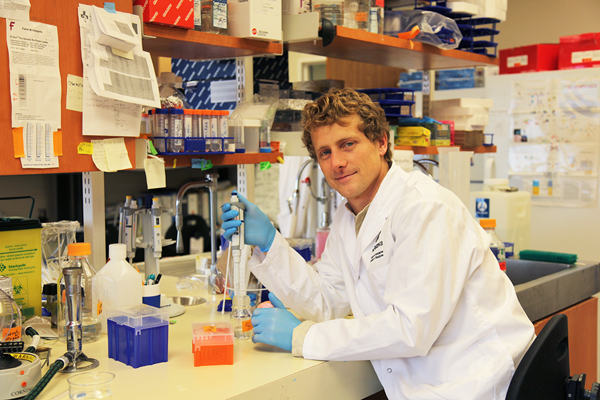Warring cellular factions
Photo courtesy of Derrick Gibbings
In what began as a quest into the mechanisms of autophagy, a cellular degradation process, has led researchers from the University of Ottawa to a major breakthrough in the fight against breast and ovarian cancer.
The team led by Derrick Gibbings, an assistant professor of cellular and molecular medicine at the U of O, decided to look into the effect of autophagy on a cell’s genetic components.
“I realized it was something that people hadn’t at all studied,” said Gibbings. “It seemed like this wide open field that no one had tested but would be very medically important.”
The project
The researchers looked into the effects of cellular degradation on retrotransposons, which are genetic molecules that make up 40 per cent of the human genome. With the ability to mutate DNA, retrotransposons are both a vital tool and a lethal weapon in the human body.
“These retrotransposons were this thing that we could study on an evolutionary scale, said Gibbings, but they also “might be causing some of these diseases like cancer.”
The result
Gibbings said they used several different experiments, including measuring autophagy in lab mice. They found that as the mice aged, the degradative process would increasingly malfunction, which corresponded with higher levels of retrotransposons.
“That, for me, was probably the most interesting part,” he said, “because it really suggests that it’s causing mutation, and that, as we know, can lead to cancer.”
Malfunctioning autophagy has been found in 35 to 70 per cent of breast and ovarian cancer tumours. The large discrepancy is due to genetic variations among different populations, said Gibbings.
What’s next?
Previous research in the field has already garnered positive results, according to Gibbings.
“There’s been a bunch of drugs that activate this pathway that have been developed and tested clinically and some of them actually work and are approved for some types of cancer,” he said.
Drugs that target the autophagy-retrotransposons mechanism also have been found to have relatively minor side effects, he added. The researchers are currently following up on a correlation between retrotransposon hyperactivity and breast cancer.
“It’s always a long path from a discovery to a drug,” said Gibbings.





